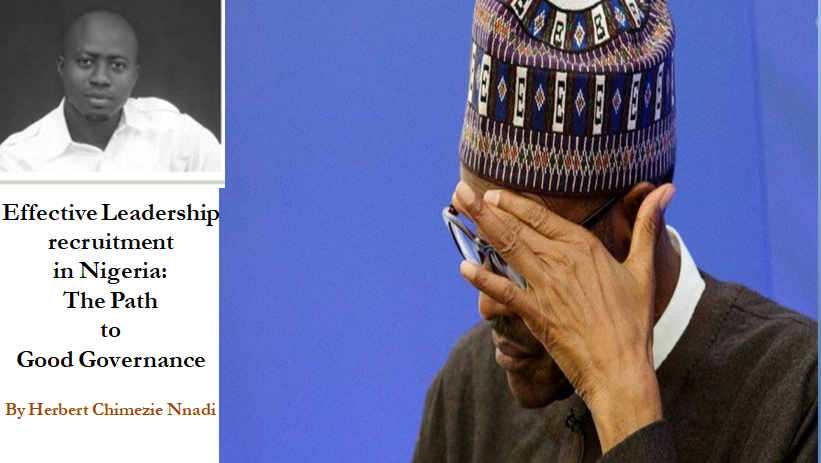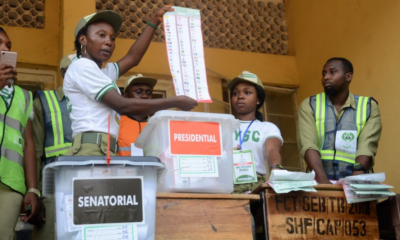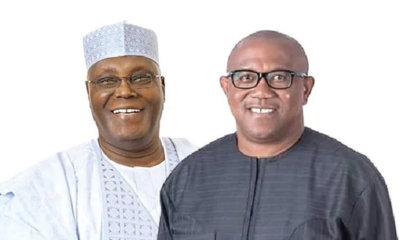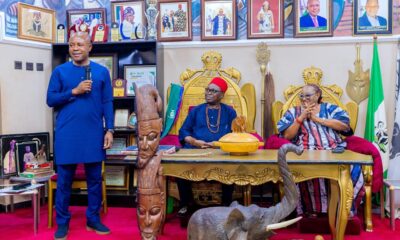GROpinion
Effective Leadership recruitment in Nigeria: The Path to Good Governance (Part 2)


Interrogating leadership recruitment in Nigeria
It is a trite knowledge that leaders are not commonly born; they are trained to become that. In the context of leadership, there is always an inexorable interplay between nature and nurture.
Through effective nurturing of the flexible natural talents, leadership traits are developed into a formalized leadership skill set. Leadership entails the capacity and will to rally men and women to a common purpose and character which inspires confidence according to Bernard Montgomery.
Who is a leader? According to Rosalynn Carter, former First Lady of the USA, “A leader takes people where they want to go. A great leader takes people where they don’t necessarily want to go, but ought to be”.
It is easily discernible that a great leader is impelled by clear vision and driven by clear purpose. A great leader would be one that would take a country bogged by underdevelopment to the mountain top of sustainable development. Nigeria has lacked such visionary leaders since its journey of nationhood.
For the emergence of a great leader in Nigeria, these fundamental questions of who, why, when and how must be cleared answered. Who should emerge as a leader requires that there must be clear cut criteria.
The “why” question, requires that if there is no thorough process for electing worthy leaders, scoundrels will take over the leadership space and plaster the landscape with infamous outcome.
The “when” question, requires a period assessment and recruitment mechanism in which election is the most preferred process. The “how” question, requires collective involvement of all adult voters who would apply an effective voting system and process in determining the emergence of qualified candidates, and not by the elite godfathers or power brokers.
The people must hold major stake in the selection and election of leaders whom they are abreast with their pedigree. These form the plank of effective leadership recruitment process. Any process that defies this order is a travesty.
What we have in Nigeria is a parlous leadership recruitment process brokered through indecorous patronage system fostered by sleazy godfathers. They have monetized the political process in order to make it to be out of the reach of the upright individuals. The wrong people are always in power in Nigeria because the political process is skewed in favour of renegades with questionable sources of wealth with which they seamlessly bulldoze their way to power. Most of these people are sponsored into office by predatory godfathers and, in recouping their investments; they call the shots from outside.
This has been impeding development in Nigeria. To service the rapacious godfathers and power brokers, the so-called leaders forced upon the electorate ensure that a large chunk of funds meant for service delivery are squirreled away to gratify the power brokers or king makers at the detriment of the masses.
Because the leadership recruitment process in Nigeria fails to address the fundamental issues that drive good governance, bad examples of leadership are always orchestrated.
The colossal effect of poor leadership recruitment process in Nigeria is that it created social stratification in which the masses are disenfranchised from taking the lead in the election of their leaders. As a result, the allocation of resources falls under the purview of the elite minority.
According to Prof. Pat Utomi, “Very few people have been taking decisions over the resources of Nigeria because there had never been good elections” – Cf. Odisu (2017). Bad elections as we have had in Nigeria can never enthrone credible candidates. Only those with questionable character would emerge to pursue anti-people agenda.
That way, mediocrity rides on popular plaudit, while the unblemished candidates whom merit would have favoured are schemed out to make them wring their hands in despair. For the fact that all virtues inherent in meritocracy are shoved aside, money wears the pretension garb of virtue, and becomes the only qualifying criterion for leadership recruitment. But under no guise would sane person waste money for an opportunity to render selfless service.
The political parties are to blame here: they make the purchase of expression of interest forms and nomination forms to cost a fortune. Constitutionally, the practice of sale of expression of interest and nomination forms by political parties is illegal, and must not be allowed to continue.
Only politicians with ulterior motive and hidden agenda would commit their ill-gotten resources into an expensive venture like Nigerian politics and this is the reason why bad guys are always in power at the detriment of the masses that cannot unite to demystify their common enemies (Cf. Odisu, 2017).
In essence, morally bankrupt process is destructive and averse to development. It stands clearly against all known tenets of democracy.
No one who would want to serve the people would have to pay huge amount of money to do that. In totality, leadership should be service-oriented, and not warped to enthrone disservice.
The Way Out
Leadership and service go hand in hand. Those that choose leaders are the people – the direct beneficiaries of good governance. For true leaders to emerge, the recruitment process must be thorough. To return leadership recruitment process to the path of integrity in Nigeria, the people must be responsible in determining the leaders.
From the lowest level of leadership to the highest, candidates must be selected or elected on the basis of merit – consideration should be given to pedigree and competence.
Based on their track records, genuine leaders must be drawn from people who are qualified based on the laid down criteria, and they must be those that are already contented with their achievements in life, and are therefore ready to serve the people. Those that go into politics to pursue private wealth should be discouraged.
The argument in support of choosing people of integrity is that only credible people have a name to protect. Once the recruitment process tolerates the emergence of rouges at any level of leadership, then, political corruption will be the order of the day. Political corruption in our context here entails the use of power by government officials for illegitimate gain.
And we are well aware that a state of unrestrained political corruption is known as a kleptocracy, literally meaning “rule by thieves”.
The major aspects of political corruption that have stymied effective leadership in Nigeria include, but not restricted to: extortion, cronyism, nepotism, favouritism, renterism, patronage, graft and embezzlement. They remain forever, the enemies of good governance and development.
Conclusion
Without doubts, politics and its effects are pervasive. Thus, opinions and perceptions of political issues are all over the map, but there is always the lamentation that contemporary political life lacked leaders was commonplace (Steven F. Hayward, Churchill on leadership – Executive success in the face of adversity, New York, Gramercy Books 1998, p. viii).
Based on our arguments, there is not yet effective leadership recruitment in Nigeria. The political godfathers exploiting parlous electoral processes and procedures cordon off the political space against credible candidates to have a field day in recruiting morally bankrupt individuals to assume positions of leadership. The outcome of this travesty has been bad governance.
The path that our leadership recruitment process has travelled so far has not been effective. It has failed to yield good results. And in real life, it amounts to foolhardiness to repeat the same process that fails to turn out good results expecting a better outcome.
To counter the progress of bad leadership, Nigeria must sanitize its leadership recruitment agenda to ensure that only people with unquestionable pedigree and competence are allowed to be selected or elected as leaders.
Those with this onus of fostering effective leadership recruitment are the people who know better the suitable candidates for whatever leadership position. Potential leaders live with their people, and the people know them.
When the people are shortchanged in this noble endeavor by corrupt godfathers who exploit warped political process to deliver candidates with questionable reputation, then, Nigeria will forever experience ineffective leadership doldrums. However, it is only by means of effective leadership recruitment that Nigeria will experience good governance.
End.
-



 GRPolitics4 days ago
GRPolitics4 days agoLet the People’s Voice Stand: A High‑Assertiveness Call to Democratic Integrity in the Digital Age
-



 Spotlight4 days ago
Spotlight4 days agoProphetic Outlook for 2026: Help Is on the Way
-



 GRPolitics4 days ago
GRPolitics4 days agoAmidst Atiku and Obi in ADC, Bola Ahmed Tinubu Retains a Significant Structural Advantage Ahead of the 2027 Election – A Data‑Driven Assessment
-



 Culture4 days ago
Culture4 days agoGovernor Mbah Visits Igwe Greg Ugwu, Enyi 1 of Attakwu, Nkanu West LGA








